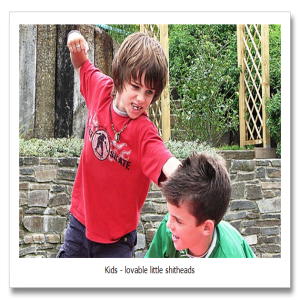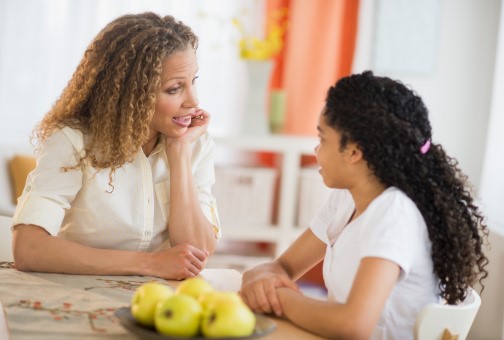Episodes

Monday Dec 02, 2019
Does your child steal?
Monday Dec 02, 2019
Monday Dec 02, 2019
Stealing is a universal child behavior. The question is size, damage, and whether he gets caught or not. Developmentally, stealing behavior falls under the category of testing limits. What to do? Stop the behavior. Confront, try to talk to your child to help him understand his needs and feelings through active listening, and give consequences. When stealing goes unaddressed, it leads to impulsivity, acting out, and a sense of entitlement, where he believes he can do anything he wants and without consequences. While any stealing is not okay, it can become a very valuable teachable moment

Tuesday Nov 26, 2019
When Trouble Comes Knocking
Tuesday Nov 26, 2019
Tuesday Nov 26, 2019
Nobody likes trouble. It's not like we invite it into our lives. But, guess what? It comes knocking for all of us. So, when trouble come knocking at your door, or when your kids are in trouble, consider a response that includes total honesty and good timing. When people lie, they only double their trouble. When people delay their response, it creates uncertainty and concerns about minimizing or manipulating. Much better to confront trouble at the door, when it comes knocking, rather than waiting for trouble to come in and set up shop in your soul.

Friday Nov 22, 2019
Is Your Child Having a Problem?
Friday Nov 22, 2019
Friday Nov 22, 2019
Sometimes our kids come to us and tell us they are having a problem. Most time? Probably not. So, when you sense that something's going on, but your child is not forthcoming, how can you tell? First, notice any differences from the normal that your child is demonstrating in terms of mood, attitude, behavior. Second, make your observations in a non-threatening way and ask about what you see. If she doesn't want to talk about it, give her space and let the next move be hers. Prying it out of her almost never works. When she's ready, use your active listening to help ease her feelings and encourage her problem-solving with your assurances that you've got her back. This is the way to really be there for her.

Saturday Nov 09, 2019
Don't Worry. Be Happy
Saturday Nov 09, 2019
Saturday Nov 09, 2019
What do you worry about? Job? School? Family? Health? Sooo much to worry about. Did you know that 80% of your worry is for nothing? This is called destructive worry. It's worrying about things over which you have no control. The weather, your boss's mood, the stock market. All you can do with these things is give up your worry. Go with the flow. On the other hand, 20% of your worry is for something. This is called constructive worry. This is worry about things over which you do have control. How well your presentation goes tomorrow. (prepare) What to give your bride for your anniversary (ask). Worries generally start with the question, "What if...?" How about replacing this worry with curiosity, "I wonder..." Then follow that wonder with a presupposional phrase, "I wonder how well I will do during my presentation tomorrow." So, don't worry. Be happy.

Thursday Nov 07, 2019
Are You a Benevolent Despot?
Thursday Nov 07, 2019
Thursday Nov 07, 2019
What's a benevolent despot? The two words seem to not go together. Despots are usually dictators, ruthless bad guys. When you are benevolent, you help others. You are kind and giving. How can a parent be both benevolent and despotic? Think of a king during the feudal Middle Ages. He had a castle with a big wall and moat around it. The villagers lived outside the walls of the castle. However, they were protected by the king. He showed them kindness and compassion, understood their needs and feelings. Because he was benevolent, the villagers shared their bounty with him, worked for him. As in a family, the benevolent despot parent is the final authority and has the final say. However, you take into consideration your children's needs and feelings when exerting your authority. Such families thrive and teachable moments abound.

Tuesday Nov 05, 2019
How Do You Lead Your Family?
Tuesday Nov 05, 2019
Tuesday Nov 05, 2019
Whether you are the mom, dad, or other parent figure, you lead your family unit. It comes with the job. How your children follow depends on how you lead. When we think of leadership, most folks are aware of the dominance or submission as leadership styles. The dominant parent declares "my way or the highway," and keeps the family in line with fear and power. The submissive parent says a lot of "yes, dear. what else can I do for you?" A fear of rejection often drives the parent to be submissive to the children. The submissive parent keeps the family in line by giving in, which generates a sense of entitlement in the children, an attitude of "I can do what I want without consequences." Wow!! No thanks. Lesser known is the parental leader of the family who presents as a "benevolent despot." You are in charge. You have earned authority in the family. What you say goes. That's the despot. Your leadership, however, is driven by empathy, compassion, and understanding of needs and feelings. That's the benevolent part. How do you lead your family?

Sunday Nov 03, 2019
Launching Our Teen into Adulthood
Sunday Nov 03, 2019
Sunday Nov 03, 2019
The two most significant moments for us parents in our children's lives are that moment of birth and their launch from adolescence into adulthood. We prepare our children for adulthood through their teen years, letting go little by little. As they learn individually to make good choices, exercise responsibility, and be accountable, they are ready to launch. Just as in our space launches, we parents remain in ground control, while our teen/young adult is in his space craft. He occasionally makes mid-course corrections, as he charts his path to his destiny. These booster rockets come from our consultations with him, just as ground control stays in contact with the spacecraft. We move from advice-based parenting (I remember when I was your age and had similar difficulties) to consultative parenting (I have some thoughts on what you are going through. Do you want to hear them?). Always, we are on the lookout the proverbial emotional fever, to which we respond with active listening. We praise his successes and are allowed bragging rights. Mission accoomplished. Our teen/young adult is launched.

Friday Nov 01, 2019
Problems? How Can You Tell?
Friday Nov 01, 2019
Friday Nov 01, 2019
Isn't it interesting that you just know when your child is having a problem? It's like your "spidey senses" tingle. It's great that you are that tuned into her, but what are you drawing on to figure it out? You child gives off both verbal and nonverbal signals when something is wrong. There's no pattern here, except that what she is saying and doing is typically not like her. In fact, some parents just come right out and ask, "Sweetheart, this isn't like you. What else is going on?" This podcast tells you about BMIRs, that is, Behavioral Manifestation of Internal Response. BMIRs tell the rest of the story and then you get the whole package. Problems will happen. Sometimes our kids are reluctant to share. It's a good thing when your spidey senses are on alert. When you get permission from your child, use your active listening to calm her down and then encourage her proactive problem-solving to help her tackle what's up.

Thursday Oct 31, 2019
Tips for Family Stress Management
Thursday Oct 31, 2019
Thursday Oct 31, 2019
We all have stress, probably all the time. It's either distress or eustress. It's how our body and mind react to bad stuff and good stuff, respectively. As parents, we need to monitor our children's stress levels by being there to help them talk it out through active listening, and also by modelling how we effectively manage our own stress. The first step is to breathe deeply and meaningfully, to give our bodies immediate relief. The next step is to help our child think through ways to avoid such specific stress in the future. Finally, both model and encourage proactive stress management through good eating, sleeping, and physical conditioning habits. In these ways, stress management can lead to teachable moments.

Friday Oct 25, 2019
Should You Fight Your Child's Battles?
Friday Oct 25, 2019
Friday Oct 25, 2019
As parents, our natural instinct is to defend our children, to fight their battles for them, to protect them at all costs. But is this natural instinct the most helpful for your child. The answer is, not necessarily so. Your response to your child's problems depends on the kind of battle and the age/stage of your child. However, as with any situation where you see his emotional fever spike, start with active listening, to bring the fever down. Then ask permission to give your thoughts about his conflict. Where some response from him is indicated, collaborate with him about what shape that response will take. Your overall message to him is, I love you. I'm so sorry you are going through a hard time. I have confidence in your being able to make sense of all of this and to work it out. I've got your back. Therein lies a teachable moment

